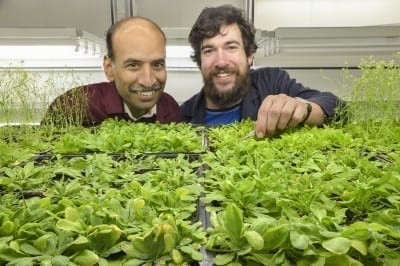
Monash researchers have discovered a new mechanism that enables plants to regulate their flowering in response to raised temperatures.
Published today in the journal Nature Plants, the finding could potentially lead to the development of technology allowing us to control the physiological response of plants and mitigate the impacts of warming temperatures.
The Monash team led by Associate Professor Sureshkumar Balasubramanian made the discovery by applying a combination of genetic, molecular and computational biology experiments to the flowering plant Arabidopsis.
Associate Professor Balasubramanian explained how two key basic cellular processes work together to reduce the levels of a protein that normally prevents flowering, allowing the plants to produce flowers in response to elevated temperature.
“This is very exciting as our understanding of how these genetic mechanisms work together opens up whole new possibilities for us to be able to develop technology to control when plants flower under different temperatures. These mechanisms are present in all organisms, so we may be able to transfer this knowledge to crop plants, with very promising possibilities for agriculture,” Associate Professor Balasubramanian said.
While Associate Professor Balasubramanian discovered the genetic basis of temperature-induced flowering ten years ago, only now, with the availability of new computational approaches, were the researchers able to discover this mechanism.
“It will be interesting to investigate whether similar mechanisms operate in the control of other genes in response to environmental changes,” said ARC Post-doctoral researcher Sridevi Sureshkumar, the paper’s first author.
Learn more: Mechanism discovered for plants to regulate their flowering in a warming world
The Latest on: Control the physiological response of plants
[google_news title=”” keyword=”control the physiological response of plants” num_posts=”10″ blurb_length=”0″ show_thumb=”left”]
via Google News
The Latest on: Control the physiological response of plants
- Plant Drought Response Hormone Found to Block Spider Miteson May 8, 2024 at 11:15 am
Recent findings from the Sainsbury Laboratory of Cambridge have found a plant drought-survival mechanism to be useful as pest control.
- Physiological responses of wheelchair athletes at percentages of top speed.on May 5, 2024 at 1:42 pm
and to examine selected physiological and metabolic responses of a group of wheelchair athletes to 60 minutes' exercise at 80% TS. METHODS: 12 male wheelchair athletes (10 paraplegics and two ...
- Plants utilize drought stress hormone to block snacking spider miteson May 3, 2024 at 10:03 am
Recent findings that plants employ a drought-survival mechanism to also defend against nutrient-sucking pests could inform future crop breeding programmes aimed at achieving better broadscale pest ...
- How Does the PlantArray Platform Transform Plant Phenotyping?on April 30, 2024 at 8:04 am
In the realm of plant science, understanding how plants grow and respond to their environment is crucial for advancing agricultural research and development. Traditional methods of phenotyping, or ...
- Plant Physiological Ecology Laboratoryon December 31, 2023 at 10:32 pm
Dr. Ewers's Laboratory investigates how plants control energy flows and mass cycles at scales ranging from organs to landscapes. His lab group uses a variety of tools in their investigations including ...
- Practical Physiology of Plantson September 8, 2023 at 4:33 pm
The text is the product of a course of instruction in the physiology of plants given at Cambridge University. To enable the students to carry out their work effectively written instructions were ...
- General Outline of Plant Physiologyon April 23, 2023 at 12:32 pm
Plant physiology is an examination of plant function ranging in complexity from individual cells up to the whole plant. As relatively immobile organisms, plants must adapt to the prevailing ...
- Plant Physiologyon April 18, 2023 at 1:42 am
A laboratory study of the physiological and biochemical responses of plants to environmental stress. We will focus on photosynthesis, water relations and mineral nutrition. Both classical and ...
- Trophic Cascades Across Diverse Plant Ecosystemson February 20, 2023 at 5:11 pm
Of these ecosystems, those dominated by plants (e.g., tundra ... where predators control grazers that would otherwise overgraze and eliminate vegetation. In response, others pointed out that ...
- Integrative Physiology—PhDon August 13, 2020 at 5:43 pm
Concentration on understanding how the transient signaling molecule nitric oxide (NO) can mediate and control physiological response in both normal and pathological conditions. Individual programs may ...
via Bing News










